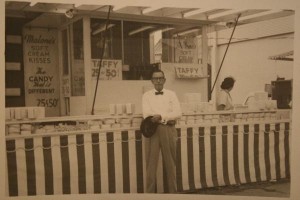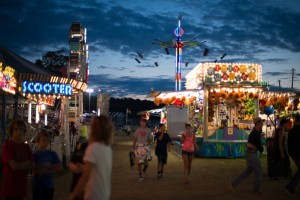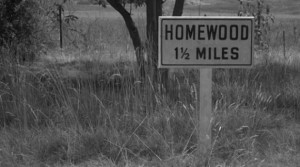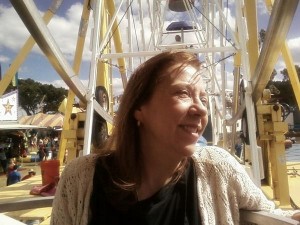 When I was a boy, my family went to the SEMO District Fair in Cape Girardeau every September without fail. It was one of the supreme treats of a happy childhood, my annual opportunity to ride the thrilling giant double Ferris wheel, eat my fill of Malone’s State Fair Taffy Candy, gorge on the Trinity Lutheran Men’s Club’s incomparably greasy and flavorful cheeseburgers, and—on one never-to-be-forgotten occasion—wander off all by myself and get hopelessly and predictably lost.
When I was a boy, my family went to the SEMO District Fair in Cape Girardeau every September without fail. It was one of the supreme treats of a happy childhood, my annual opportunity to ride the thrilling giant double Ferris wheel, eat my fill of Malone’s State Fair Taffy Candy, gorge on the Trinity Lutheran Men’s Club’s incomparably greasy and flavorful cheeseburgers, and—on one never-to-be-forgotten occasion—wander off all by myself and get hopelessly and predictably lost.
The last time I went to the SEMO District Fair, or any other fair, was in 2001, a couple of days after 9/11. I recalled the occasion in this space a decade ago:
I was stranded in Smalltown, U.S.A., waiting for the planes to start flying again so that I could make my way back to Manhattan. Though all of us in Smalltown were stunned by the horrors that had just played out on our TV screens, we knew we needed a break from reality, so I drove up to the fair with my mother, my brother, and his family, and we bought taffy and rode the rides. Alas, the double Ferris wheel was long gone–no doubt it had proved too tame for a generation of thrill-seeking youngsters raised on modern-day theme-park roller coasters–but the taffy hadn’t changed a bit.
 Since then I’d assumed that my fairgoing days were over. But Mrs. T pointed out a few weeks ago that the Woodstock Fair isn’t far from our place in Connecticut, and she suggested that we go there this year. That struck me as a wonderful idea, so we jumped in the car on Saturday and drove to Woodstock, where we spent a balmy afternoon eating corndogs and cotton candy, inspecting pumpkins, melons, chickens, rabbits, and farm machinery, and (best of all!) riding the Ferris wheel and bumper cars. We even brought home a sack of taffy.
Since then I’d assumed that my fairgoing days were over. But Mrs. T pointed out a few weeks ago that the Woodstock Fair isn’t far from our place in Connecticut, and she suggested that we go there this year. That struck me as a wonderful idea, so we jumped in the car on Saturday and drove to Woodstock, where we spent a balmy afternoon eating corndogs and cotton candy, inspecting pumpkins, melons, chickens, rabbits, and farm machinery, and (best of all!) riding the Ferris wheel and bumper cars. We even brought home a sack of taffy.
I doubt you’ll be surprised to learn that our trip put me in mind yet again of Walking Distance, the 1959 episode of The Twilight Zone in which Martin Sloan, a harried advertising executive from New York, visits Homewood, the small town where he grew up, one fine summer day. He notices that nothing about the town has changed and in short order realizes that the clock has somehow been mysteriously turned back and that he is in the Homewood of his youth, where the carousel still turns and the calliope still plays.
 The way Martin Sloan felt on that mysterious day in Homewood was the way I felt, more or less, when I returned to Smalltown for a visit shortly after my brother began to remodel the house in which we’d grown up together and in which he and his wife now live. He started, logically enough, by stripping my old, long-unoccupied bedroom to the walls, and I was briefly but thoroughly nonplussed when I entered the room and found it bare:
The way Martin Sloan felt on that mysterious day in Homewood was the way I felt, more or less, when I returned to Smalltown for a visit shortly after my brother began to remodel the house in which we’d grown up together and in which he and his wife now live. He started, logically enough, by stripping my old, long-unoccupied bedroom to the walls, and I was briefly but thoroughly nonplussed when I entered the room and found it bare:
The bed I’d slept in, the bookshelf that once held my burgeoning library of paperbacks, the chest of drawers in which I placed my neatly folded clothes–all had vanished. Even the carpet was gone….
I stepped inside and was no less startled by how small the room looked. Could I really have grown up in this cramped chamber? Was this the place in which I dreamed my youthful dreams of glory? It was—or, rather, it had been. Now it was an empty, memory-free space waiting to be brought to life once more.
 Going to the Woodstock Fair, on the other hand, made me feel, if only fleetingly, that Martin Sloan’s father was wrong to warn his son that you can’t go home again: “We only get one chance. Maybe there’s only one summer to every customer.” Maybe so, but you couldn’t have proved it by me on Saturday. Most of the sights, sounds, and smells of the Woodstock Fair proved to be all but indistinguishable from what I’d seen, heard, and smelled in Cape Girardeau a half-century ago, and I found it unexpectedly easy to relax my grip on the present and revel for a couple of blissful hours in the simple joys of an old-fashioned midway. All that mattered was the perfect moment in which I was suspended, and the presence of the loving and beloved companion with whom I shared it. If only for the space of a single blessed August afternoon, time had been regained and the carousel still turned.
Going to the Woodstock Fair, on the other hand, made me feel, if only fleetingly, that Martin Sloan’s father was wrong to warn his son that you can’t go home again: “We only get one chance. Maybe there’s only one summer to every customer.” Maybe so, but you couldn’t have proved it by me on Saturday. Most of the sights, sounds, and smells of the Woodstock Fair proved to be all but indistinguishable from what I’d seen, heard, and smelled in Cape Girardeau a half-century ago, and I found it unexpectedly easy to relax my grip on the present and revel for a couple of blissful hours in the simple joys of an old-fashioned midway. All that mattered was the perfect moment in which I was suspended, and the presence of the loving and beloved companion with whom I shared it. If only for the space of a single blessed August afternoon, time had been regained and the carousel still turned.
* * *
The epilogue of “Walking Distance,” a 1959 episode of The Twilight Zone written and narrated by Rod Serling. The score is by Bernard Herrmann:
Jo Stafford, Rosemary Clooney, Mel Tormé, and Edd Byrnes sing “County Fair” (by Tormé and Robert Wells) on The Jo Stafford Show, a 1961 TV special:
